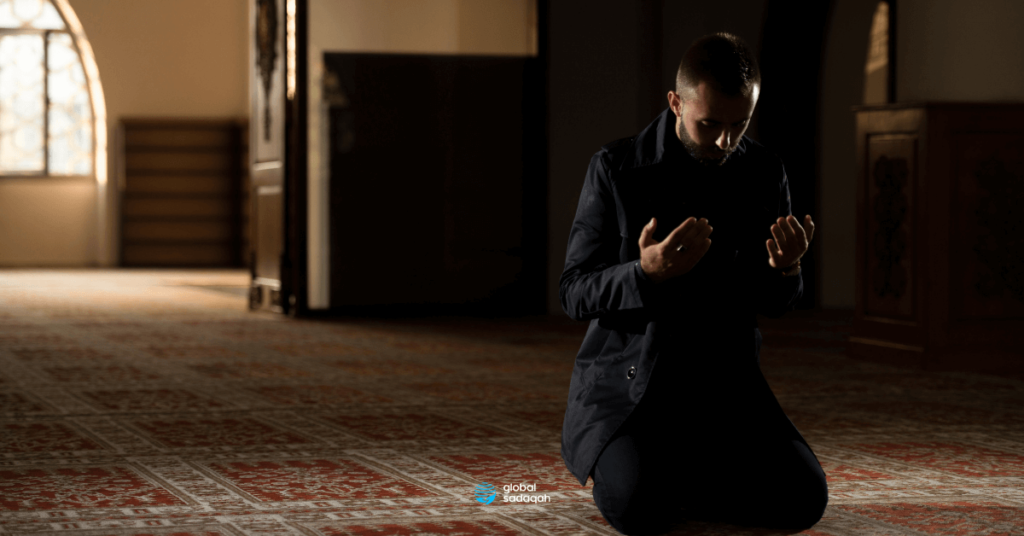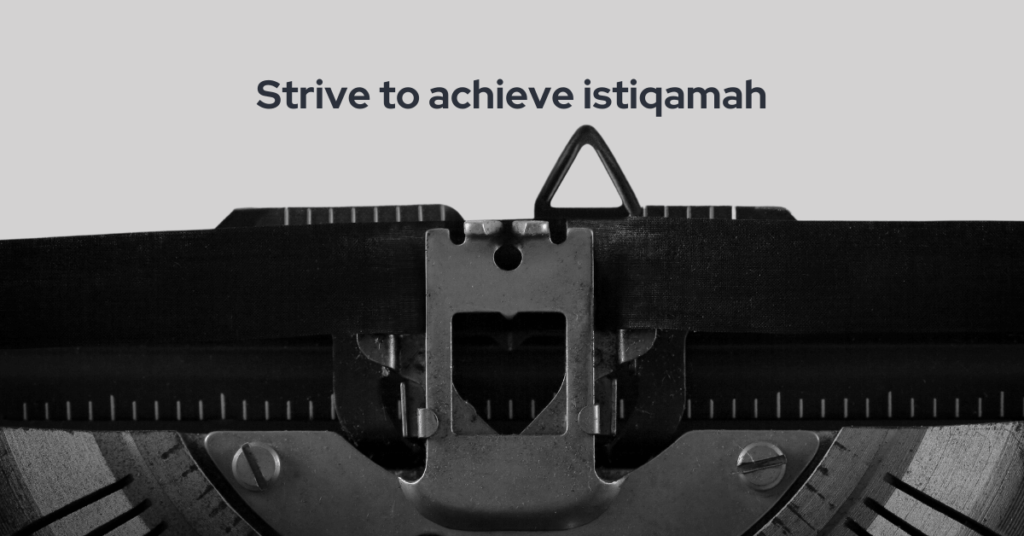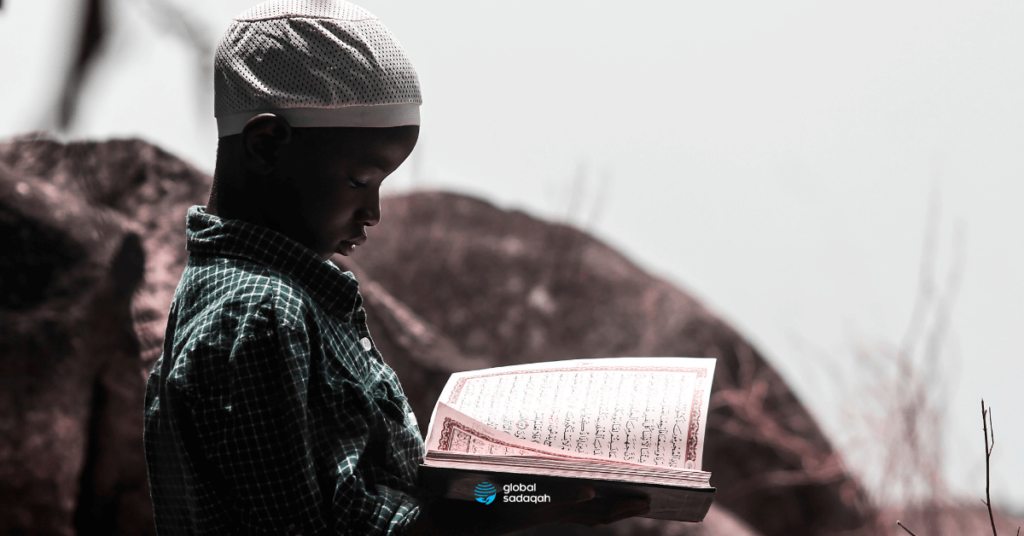People say consistency is key but what does it mean to be consistent? Contrary to popular belief, consistency is not merely about doing the same things repeatedly over time but rather it’s the steadfastness in one’s commitment towards something. To be consistent is to be clear of the commitment and to remain steadfast in committing to it. In Islam, this concept is called istiqamah. It’s a quality that Islam places a huge emphasis on among Muslims.
Umar ibn al-Khattab when asked about istiqamah replied, “It is that you should be steadfast on the matters that are obligated and to abandon the prohibitions.” Let’s dive deeper into this by dissecting what the Prophet ﷺ said about istiqamah.
Hadith about istiqamah
Sufyan bin ‘Abdullah once asked the Prophet ﷺ, “O Messenger of Allah, tell me something of Islam which I will not ask anyone else about it.” The Prophet ﷺ said,
“قل آمنت بالله: ثم استقم”
“Say, ‘I believe in Allah’ and then be steadfast”. [Muslim]
This concise hadith is a beautiful example of the Prophet’s comprehensiveness in speech (jawami’ al-kalim), one of the countless miracles that Allah bestowed upon him. In just a few words, he was able to convey a comprehensive message.
The first part of the hadith captures the essence of one’s declaration of belief while inviting one to review one’s iman (faith) through the tongue and remembrance of the heart. The second part talks about the application of Islam in one’s life through istiqamah – it reminds us to remain steadfast (istiqamah) in our obedience to Allah and to refrain from any acts of disobedience.
Related: 11 Hadiths About Sadaqah
What does it take to be istiqamah?
Based on the hadith, it can be inferred that to be istiqamah is to stand firm and to remain steadfast in religion by doing what Allah has commanded us and avoiding what He prohibits.
In order to achieve this, we must fulfill our obligations as Muslims and guard ourselves against being misled by our own desires or external forces that will lead us astray. But as human beings, we have the tendency to err and to deviate from the teachings of Islam. It’s part of our human nature. So how do we fix this?
It’s by seeking forgiveness from Allah. He created us and no one understands one’s creations better than the Creator Himself.

“Say, O [Muhammad], ‘I am only a man like you to whom it has been revealed that your god is but one God; so take a straight course to Him (be steadfast) and seek His forgiveness.” [Surah Fussilat: 6]
The verse tells us to strive to be steadfast but to seek forgiveness from Allah in our moments of weakness. So seeking forgiveness through istighfar and taubah (repentance) is instrumental in our journey to remain steadfast in the path of Allah and to achieve istiqamah.
Achieving istiqamah
Anas ibn Malik reported that the Prophet ﷺ said: “The faith of a servant will not be steadfast until his heart becomes steadfast, and his heart will not become steadfast until his tongue becomes steadfast.” [Musnad Ahmad]
So what can we do to become steadfast? According to Imam Ibn al-Qayyim, there are five conditions to achieve istiqamah in our obedience to Allah.
- To do what Allah asks us to do for the sake of Allah alone (ikhlas).
- To do it on the basis of knowledge (‘ilm).
- To perform acts of worship (ibadah) in the same manner that they have been commanded.
- To do it in the best way possible.
- To restrict ourselves from what is lawful while performing those deeds.
We can also strive to achieve istiqamah by having and following these four Is:
- Iman – Iman is the firm and sound belief of the heart and this includes the actions of the limbs that follow it.
- Ittiba – Perfecting our obedience of the Prophet and opposition to the innovations. We don’t pick and choose what and when we like. The Sunnah is like the Ark of Nuh, those who embark on it are safe and those who don’t are lost.
- Ibadat – Perfecting our acts of worship especially the main pillars of Islam.
- I’tidal – Perfecting our sense of balance and justice, and avoiding any form of extremism.
But being steadfast is not something that can be achieved overnight. We may slip and fall short, but that is okay because we are human. We don’t have to be too tough on ourselves. Islam itself is a religion of moderation. If you remain moderate, it’s more sustainable for a long run and you can continue doing good for a much longer time.
Applying istiqamah in our day-to-day life
Achieving istiqamah is a lifelong journey for Muslims. It’s applicable not only to in our mandatory obligations to Allah but also in our day-to-day life. At the end of the day, whatever we do in this world is to gain the pleasure of Allah and every single deed we that do will become an act of worship if we do it for the sake of Him. That is the beauty of living life as a Muslim.
Related: 9 Tips to Prepare for Ramadan 2022

Abu Huraira narrated that the Prophet ﷺ said, “The deeds of anyone of you will not save you (from the (Hell) Fire).” They said, “Even you (will not be saved by your deeds), O Allah’s Messenger (ﷺ)?” He said, “No, even I (will not be saved) unless and until Allah bestows His Mercy on me.
Therefore, do good deeds properly, sincerely and moderately, and worship Allah in the forenoon and in the afternoon and during a part of the night, and always adopt a middle, moderate, regular course whereby you will reach your target (Paradise).” [Bukhari]
Related: Good Deeds that Outlast Death | 5 Types of Sadaqah Jariyah

